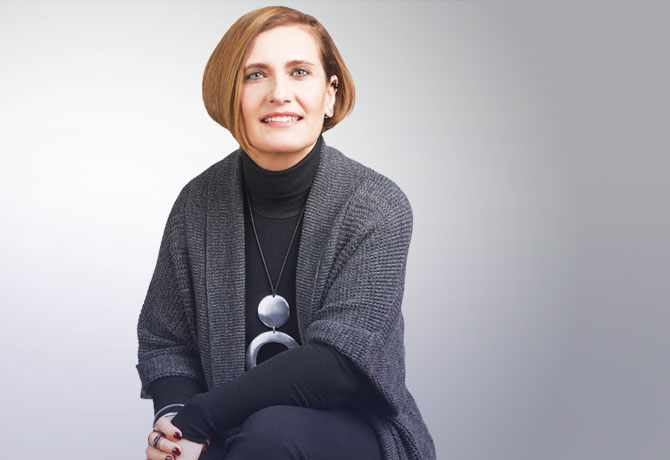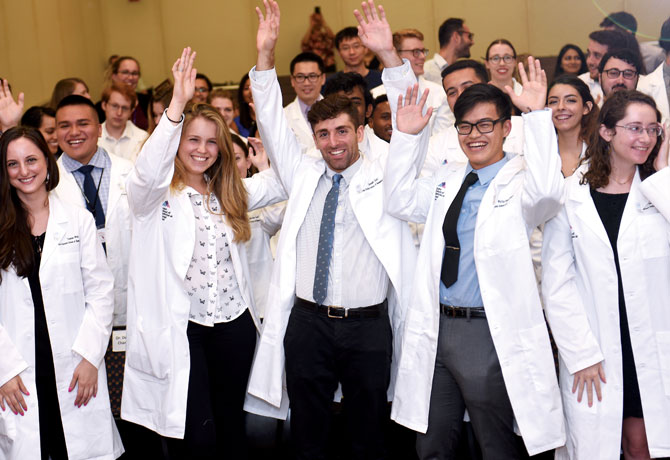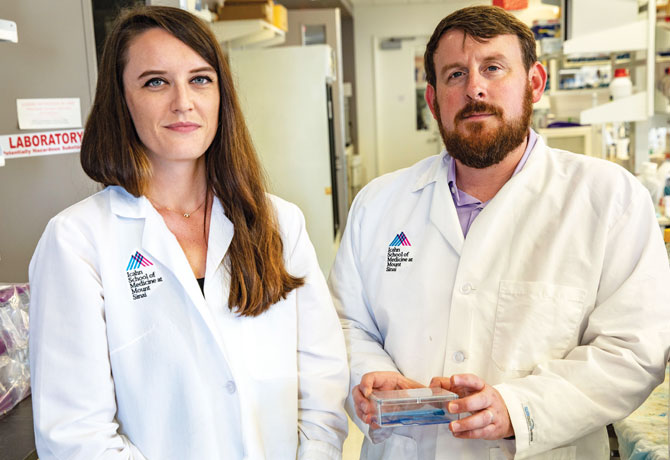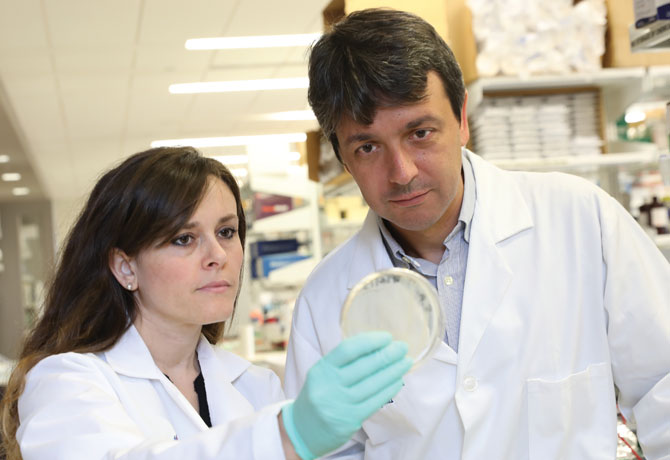

At the core of our success is our faculty—extraordinary researchers and mentors who encourage our students and trainees to think boldly, without boundaries, and to take measured risks that spur innovation and advances.
As the Icahn School of Medicine at Mount Sinai and its Graduate School of Biomedical Sciences celebrate a 50-year anniversary, we have vastly expanded—and reimagined—our advanced graduate education (PhD) and professional training (Master's) programs to give basic scientists and physician scientists the ability to develop the specialized skills that are necessary to succeed in twenty-first century biomedical and health care sciences.
This report highlights:

How does graduate education in biomedical sciences adapt to the changing demands posed by increasingly complex biological problems?
At Mount Sinai, that means taking a more interdisciplinary approach to scientific discovery—one that has a strong foundation in computational thinking and training in data science and advanced quantitative methods. As the Icahn School of Medicine at Mount Sinai and its Graduate School of Biomedical Sciences celebrate a 50-year anniversary, we have vastly expanded—and reimagined—our advanced graduate education (PhD) and professional training (Master's) programs to give basic scientists and physician scientists the ability to develop the specialized skills that are necessary to succeed in twenty-first century biomedical and health care sciences.
While Public Health remains the largest master’s program at Mount Sinai with an average of more than 70 trainees per year over the past 5 years, we are expanding the master’s program in Biomedical Sciences to build upon Mount Sinai's exceptional research opportunities. We also have master’s programs in biostatistics, genetics counseling, clinical research, health care delivery leadership, and our newest, biomedical data science.
Providing education and training in entrepreneurship is a fundamental mission at Mount Sinai, whereby students—who have unparalleled opportunities in innovative business models—learn how to commercialize a product, bring it to market, and create a start-up. Sema4, a patient-centered predictive health company and venture of Mount Sinai, led by its Founder and CEO, Eric Schadt, PhD, Dean for Precision Medicine at the Icahn School of Medicine at Mount Sinai, is an excellent example of entrepreneurship at this level.
At Mount Sinai, we are addressing the challenge of the increasing scarcity of academic positions for PhD holders by diversifying our training and preparing our graduates to enter not only academia, but to pursue opportunities in industry, allied health care, consulting, finance, medical and scientific writing, government, and nonprofit organizations.
All of these efforts—led by our outstanding faculty—have been facilitated by Mount Sinai being more nimble than other institutions. And, for innovation, that is absolutely required.
Mount Sinai has joined a growing number of institutions that have discontinued the GRE requirement—“exit the GRE” (#GRExit).
“The idea that the GRE is a reliable metric, or a predictor of success, has no basis in reality,” says Marta Filizola, PhD, Dean of the Graduate School of Biomedical Sciences at the Icahn School of Medicine at Mount Sinai. “Based on a thorough review of the literature on the GRE, it is clear that this standardized test does not predict graduate school outcomes such as first-author publications, conference presentations, and fellowships or grants awarded.
Furthermore, analysis of data from the Educational Testing Service, which administers the GRE, indicates that the tests skew against women and students from underrepresented backgrounds. GRE tests are also expensive, and test preparation programs are not easily accessible to applicants who are economically disadvantaged. A fair admissions process that welcomes those who are underrepresented in science cannot move forward with the GRE standing in its way.”
In New York City, the GRE is required by most institutions, with the exception of Rockefeller University, which has made the GRE optional.
As public awareness and discourse about mental health continue to grow, so, too, have discussions about life satisfaction among graduate students and postdocs. These discussions have become more pressing following several recent studies revealing higher rates of anxiety and depression in PhD students, master’s students, and postdoctoral trainees than in the general public.
Understanding this, the Graduate School of Biomedical Sciences at the Icahn School of Medicine at Mount Sinai is taking steps to enhance health and well-being in these populations, drawing on the extensive research and advocacy work of Jonathan Ripp, MD, MPH, newly appointed Senior Associate Dean for Well-Being and Resilience, and Chief Wellness Officer at the Icahn School of Medicine.
One of Dr. Ripp’s first initiatives was creating the Office of Well-Being and Resilience, a team of dean-level colleagues tasked with developing and overseeing mental health and well-being initiatives. Basil Hanss, PhD, Senior Associate Dean for Student Affairs and Career Development, an early appointment to this team, is serving as Associate Dean for Graduate School Well-Being and Resilience.
“Science is a really stressful career, and if students are to succeed, we must help them understand how to address and handle the stressors they will face,” Dr. Hanss says.
Initiatives will be informed by issues that graduate students and postdocs have raised through discussions with Dr. Ripp and Dr. Hanss, needs assessment surveys undertaken by the student-led Trainee Health and Wellness committee, and published studies. Among the issues are fierce competition for research funding, the demands of completing a PhD program, and the relative isolation scientists experience in a laboratory environment.
“Postdocs do not necessarily have a strong cohort for celebrating achievements or consoling each other over failures,” Dr. Hanss says. “They also feel constant pressure to be in the lab working, which makes it difficult for us to plan social events that encourage a sense of community. We are looking at ways to ensure the laboratory environment is a supportive one.”
One initiative already in place, Mentoring the Mentor, shows significant potential to address anxiety and depression. Delivered through the Icahn School of Medicine at Mount Sinai's Office of Academic Development and Enrichment under the leadership of Lakshmi Devi, PhD, Dean for Academic Development and Enrichment, the program, which currently is offered to senior clinical faculty members, will equip research faculty with tools and skills to support graduate students and postdocs. “Graduate students and postdocs are worried about their futures,” Dr. Devi says.
“Through this program, we are giving mentors a greater ability to talk graduate students and postdocs through their fears, helping them align their expectations, be independent, determine their career paths, and achieve work-life balance for greater contentment.”
Adds Dr. Ripp, “We want applicants to know they are coming to a school that cares not only about their academic success but also about them as people. We want to see them thrive and feel professionally fulfilled.”

On Monday, September 17, the Graduate School of Biomedical Sciences at Mount Sinai held its inaugural PhD Lab Coat Ceremony—the only institution in New York City, and one of the few in the country, to honor its PhD students in this fashion.
The ceremony, intended to become an annual event, recognized Mount Sinai’s entering class of new PhD students in Biomedical Sciences, Neuroscience, and the Medical Scientist Training Program.
Training and education of the workforce for twenty-first century biomedicine requires special attention to computational, mathematical, and statistical thinking to maximize the utility of extensive biomedical data in the pursuit of successful and personalized treatments.
To advance this effort, the Biomedical Data Science Initiative was created to bridge research and educational endeavors in computing and big da ta analytics across various departments and institutes. The initiative involves a network of specialized areas, including Computational Genomics, Computational Biophysics, Systems Pharmacology, Biomedical Engineering, Imaging and Visualization, Biostatistics, Clinical Epidemiology, Clinical Trials, Environmental Medicine, Public Health, Health System Design, and Health Information Technology.
In addition to providing an intellectual home for collaborative data-driven research, it offers outstanding computational training to postdocs and graduate students through a variety of Master’s, PhD, and postgraduate programs.
The initiative includes the 2019 launch of the Master in Biomedical Data Science (MBDS) program, which aims to motivate students with a strong quantitative background (for example, undergraduate majors in computer science, mathematics, physics, engineering, chemistry, or related quantitative disciplines) to work on complex biomedical problems and diseases. The program offers access to innovative coursework in various aspects of biomedical sciences, integrated with machine learning, computer systems, big data analysis and visualization, as well as large electronic medical record-linked biomedical repositories.
To create a pipeline for postdoctoral trainees who are underrepresented in science, the Graduate School of Biomedical Sciences at the Icahn School of Medicine at Mount Sinai is partnering with Nashville, Tennessee-based Meharry Medical College—one of the nation’s top historically black colleges and universities—on an initiative that will provide research opportunities to selected advanced graduate students.
Set to launch in summer 2019, the Meharry-Mount Sinai Research Scholars Program will provide up to three Meharry scholars with an eight-week intensive research opportunity in cancer biology, neuroscience, microbiology, or immunology at Mount Sinai each year.
A joint committee of senior faculty will identify candidates, familiarize Meharry graduate students with Mount Sinai’s research, and consider measures that will provide a laboratory environment that helps each participant flourish.
“This partnership will bring Meharry graduate students into a research environment with state-of-the-art technologies and facilities, in one of the densest—and most diverse—geographical locations for biomedical research in the world,” says Matthew O’Connell, PhD, Senior Associate Dean for Curriculum, Recruitment and Admissions. “Programs like these underscore our ongoing commitment to diversity as we develop the next generation of scientists. Our goal is to train students from a wide range of backgrounds to reach their full potential at the Icahn School of Medicine at Mount Sinai.”
Undergraduate students interested in exploring careers as research scientists can now gain early admission into PhD and MD/PhD programs at the Graduate School of Biomedical Sciences at the Icahn School of Medicine at Mount Sinai through the FlexGrad Program.
Launched in 2017, the FlexGrad Program is open to select rising juniors and seniors currently enrolled in the Graduate School’s Summer Undergraduate Research Program (SURP). It is a new approach to doctoral program admissions in that SURP students are eligible for early acceptance to graduate school while still in college (with waived MCAT and GRE requirements), and even receive credit for laboratory rotations.
Kristen Brennand, PhD, Associate Professor of Neuroscience, Genetics and Genomic Sciences, and Psychiatry, is Co-Director of the SURP/FlexGrad Program with Dusan Bogunovic, PhD, Assistant Professor of Microbiology, and Pediatrics.
“We are trying to show these students what is happening on the front lines of science,” Dr. Brennand says. “We treat them like graduate students—they are doing cutting-edge research, so they become scientists. With FlexGrad, we can give them the peace of mind of knowing where they are going next.”
FlexGrad eligibility is based on several factors—particularly academic excellence and exceptional research experience—as well as enrollment in SURP. Just as for SURP students, those selected for the FlexGrad Program also receive free housing and a $5,000 direct reimbursement for the summer course as they participate in one of the most collaborative, innovative graduate programs in the country. “Our students today will be the science leaders of tomorrow,” Dr. Brennand says. “We are training them to be bold, ask big questions, and move science forward.”
Two early-career scientists received the 2018 Robin Chemers Neustein Postdoctoral Fellowship Award. The recipients—Lorna Farrelly, PhD, and Sabrina Tamburini, PhD—will each receive an award of $25,000 to further their research.

Dr. Farrelly works in the laboratory of Ian Sutherland Maze, PhD, in the Fishberg Department of Neuroscience. She is investigating susceptibility to psychiatric illness via novel neuroepigenetic brain mechanisms potentially responsible for neural plasticity.
Dr. Tamburini works in the laboratory of Jose Clemente, PhD, in the Department of Genetics and Genomic Sciences. Her research is focused on understanding what constitutes a “healthy” microbiome and how the microbiome is related to overall health and disease.

Intended to encourage and support female research scientists at the Icahn School of Medicine at Mount Sinai, the fellowship was established in 2010 through a generous gift from Robin Chemers Neustein, JD, MBA, a former member of Mount Sinai’s Boards of Trustees.